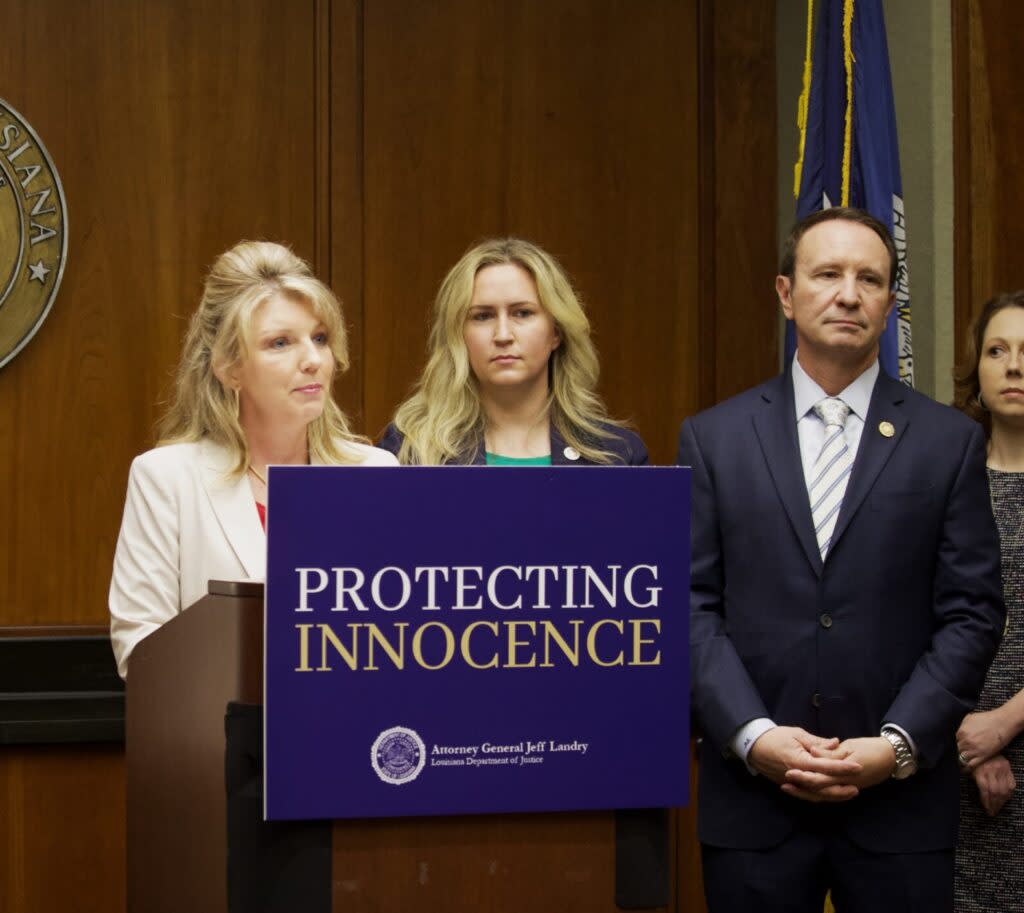Louisiana Senate bill would gut public records access

- Oops!Something went wrong.Please try again later.
- Oops!Something went wrong.Please try again later.
Sen. Heather Cloud, R-Turkey Creek, speaks about a bill she introduced to restrict minors' access to certain library materials. Rep. Julie Emerson, R-Carencro, center, plans to introduce a similar bill. Attorney General Jeff Landry, right, is supporting both bills. (Photo by Remi Tallo)
Public unrest.
That’s what Sen. Heather Cloud, R-Turkey Creek, fears would happen if the public were made privy to the state government’s deliberative records — records they can already access.
Public safety is the justification for Cloud’s Senate Bill 482, which would create one of the broadest ever public records exemptions for state government. Her proposal would deny access to records “reflecting advisory opinions, recommendations and deliberations comprising part of a process by which governmental decisions and policies are formulated.”
That’s nearly every public record — at all levels of government.
Public records laws protect the public’s right to know what governments are doing. They’re part of “sunshine laws” that every state and the federal government has put in place to protect transparency.
Cloud said citizens may react poorly if exposed to an advisory opinion or deliberations for a decision that has not yet been made.
“If the wrong information or premature information is released before they have finalized a finding… it could be dangerous for the public to get the wrong information,” Cloud said in an interview.
Cloud’s bill has the support of Republican Gov. Jeff Landry, who has sought to consolidate his power through a series of bills giving him more power over appointed boards and exempting records related to the governor from public access.
“The public records law is designed to bring transparency to the taxpayer as the government spends their precious tax dollars. Over time these laws have become weaponized to stifle deliberative speech,” Landry said in a statement to the Illuminator. “This frustration has been communicated to me by all public officials — that the current law is stretched and is being abused and weaponized.”
“The citizens of the state overwhelmingly chose me for this job to reform failures in state government. This is yet another reform,” Landry added.
GET THE MORNING HEADLINES DELIVERED TO YOUR INBOX
Cloud said her bill merely puts into law what courts have already decided.
Cloud said the 2004 state case Kyle v. Louisiana Public Service Commission already allows government entities to reject public records requests for deliberative records. But one of the state’s leading experts on government transparency disagrees with Cloud’s assessment.
“If the privilege that is contained within SB 482 were the law of Louisiana, we would not have been getting public records all this time,” Scott Sternberg, an attorney with expertise in media and public records law, said in an interview. “I have no knowledge of an existing privilege that is anything like SB 482, and neither does any other journalist or lawyer that I know.”
The Louisiana Illuminator submitted more than 300 public records requests in 2023. None were rejected based on the court case Cloud cited.
Journalists use public records requests to investigate government efficiency and wrongdoing. Any citizen who has an interest in how their government operates can also request public records.
The Louisiana public would be most adversely affected by Cloud’s bill, Steven Procopio, president of the good governance group Public Affairs Research Council of Louisiana, said in a statement to the Illuminator.
“This bill is broad in scope and sweeping in effect,” Procopio said. “It would eliminate the right to access any records used as part of a governmental decision and would apply to both state and local governments. I cannot discern what benefit this would have for the Louisiana public.”
“I am gravely concerned,” Procopio added.
Several other states have exceptions for deliberative records, but most are much narrower than what’s proposed in Cloud’s bill and often apply only to the executive branch.
Former Republican Gov. Bobby Jindal had some of the broadest exemptions, but these were rolled back after Jindal left office.
Landry has touted transparency as a core value of his administration.
In a special session on crime earlier this year, the governor supported a bill to give the public more access to juvenile court records that have historically been shielded from public view to protect minors.
“The lack of transparency in our criminal justice system is unacceptable,” Landry said during his opening remarks for that session.
Despite these overtures to transparency, Landry and his Republican allies have moved to shield records related to matters of public interest from public view. Cloud’s bill would exempt nearly everything.
The Legislature has already passed a bill that would shield records related to executions and is advancing bills that would shield records related to economic development projects, public officials’ schedules and the Governor’s Mansion.
Additional bills in the Legislature would limit public records access to only Louisiana residents.
Landry said Cloud’s bill is actually pro-transparency.
“The public records law is designed to bring transparency to the taxpayer as the government spends their precious tax dollars,” Landry said. “During my time as Attorney General we had to hire 2 lawyers that worked full-time answering sometimes senseless requests from people with no connection to our State.
“We have always appreciated transparency when it comes to fiscal manners,” Landry added.
Cloud’s bill will be discussed Wednesday in the Senate and Governmental Affairs Committee.
The post Louisiana Senate bill would gut public records access appeared first on Louisiana Illuminator.

